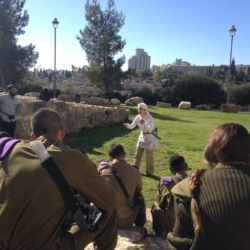| Source (Hebrew) | Translation (English) |
|---|---|
צוּר מִשֶּׁלּוֹ אָכַֽלְנוּ בָּרְכוּ אֱמוּנַי שָׂבַֽעְנוּ וְהוֹתַֽרְנוּ כִּדְבַר יְיָ׃ |
Rock from whose store we have eaten — Bless him, my faithful companions. Eaten have we and left over — This was the word of YHVH. |
הַזָּן אֶת עוֹלָמוֹ רוֹעֵֽנוּ אָבִֽינוּ אָכַֽלְנוּ אֶת לַחְמוֹ וְיֵינוֹ שָׁתִֽינוּ עַל כֵּן נוֹדֶה לִשְׁמוֹ וּנְהַלְּלוֹ בְּפִֽינוּ אָמַֽרְנוּ וְעָנִֽינוּ אֵין קָדוֹשׁ כַּייָ׃ |
Feeding his world like a shepherd— Father whose bread we have eaten, Father whose wine we have drunken. Now to his name we are singing, Praising him loud with our voices, Saying and singing for ever: Holy is none like YHVH. |
בְּשִׁיר וְקוֹל תּוֹדָה נְבָרֵךְ לֵאלֹהֵֽינוּ עַל אֶֽרֶץ חֶמְדָּה טוֹבָה שֶׁהִנְחִיל לַאֲבוֹתֵֽינוּ, מָזוֹן וְצֵדָה הִשְׂבִּֽיעַ לְנַפְשֵׁנוּ, חַסְדּוֹ גָּבַר עָלֵֽינוּ וֶאֱמֶת יְיָ׃ |
Singing with sound of thanksgiving, Bless we our God for the good land Given of old to our fathers; Bless we him now who has given Food for our hunger of spirit; Strong over us is his mercy, Mighty the truth of YHVH. |
רַחֵם בְּחַסְדֶּֽךָ עַל עַמְּךָ צוּרֵֽנוּ, עַל צִיּוֹן מִשְׁכַּן כְּבוֹדֶֽךָ זְבוּל בֵּית תִּפְאַרְתֵּֽנוּ, בֶּן דָּוִד עַבְדֶּֽךָ יָבוֹא וְיִגְאָלֵֽנוּ, רֽוּחַ אַפֵּֽינוּ מְשִֽׁיחַ יְיָ׃ |
Mercy, O Rock, for thy people! Pity the place of thy glory, Zion, the house of our beauty. Soon shall he come to redeem us— Offspring of David, thy servant, He that is breath of our spirit Send thine anointed, O YHVH! |
יִבָּנֶה הַמִּקְדָּשׁ עִיר צִיּוֹן תְּמַלֵּא וְשָׁם נָשִׁיר שִׁיר חָדָשׁ וּבִרְנָנָה נַעֲלֶה הָרַחֲמָן הַנִּקְדָּשׁ יִתְבָּרַךְ וְיִתְעַלֶּה עַל כּוֹס יַֽיִן מָלֵא כְּבִרְכַּת יְיָ׃ |
O that the Temple were builded, Filled again Ẓion our city— There a new song shall we sing him, Merciful, holy and blessed,— Bless we him now and for ever, Over the full brimming wine-cup, Blest as we are of YHVH. |
The hymn “Rock from whose store we have eaten” is of unknown authorship. It is based on the paragraphs of the Grace after Meals, and the refrain is made up from the first phrase of the Grace and the verse (2 Kings 4:44) which comes towards the close of the Grace in the Sephardic version. As Baer (p. 205) points out there is no reference to the Sabbath in this hymn, which is, he adds, appropriate for any occasion. The translation is by Mrs R. N. Salaman (some phrases and the metre being taken from a rendering by Mr I. Zangwill).
The main scriptural references are: Refrain, see [above]; my faithful companions, cf. 2 Sam. 20:19. There is none holy as the Lord , 1 Sam. 2:2. The good land (Heb. חֶמְדָּה, some read חֶמְדָּה טוּבָה) Jeremiah 3:19 etc. Strong over us is his mercy, Ps. 117:2. Zion the house of our beauty, Isaiah 63:15. Offspring of Davids thy servant, a Messianic reference, cf. Jer. 33:15. The breath of our spirit etc. (lit. the breath of our nostrils) Lamentations 4:20. Filled again Ẓion, i.e. either repopulated or filled with righteousness, Isaiah 33:5. Over the full brimming wine- cup refers to the cup of wine (called cup of blessing) taken alter the grace (Pesahim 103a). –Israel Abrahams
I have re-hebraicized divine names. –Aharon Varady
Source(s)


“צוּר מִשֶּׁלּוֹ אָכַֽלְנוּ | Tsur Mishelo Akhalnu, a paraliturgical Birkat haMazon (translation by Nina Salaman 1914)” is shared through the Open Siddur Project with a Creative Commons Public Domain Dedication 1.0 Universal license.










Leave a Reply